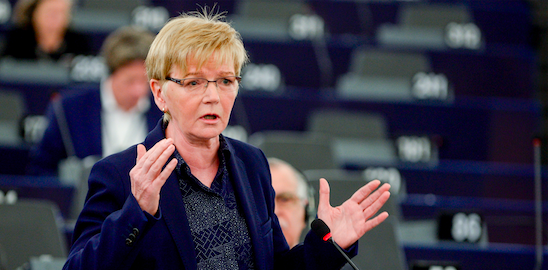20.03.2017 - 11:18
The sentences against the political leaders responsible for the 9-N symbolic vote on Catalan independence in 2014 have outraged MEPs from a range of different political parties. “I find it wrong,” European Conservatives and Reformists MEP Ian Duncan told the CNA and added that fining and banning from public office former Catalan President Artur Mas, former Vice President Joana Ortega and former Catalan Minister for Education Irene Rigau “would harm democracy” in Spain. In a similar sense, the Greens/European Free Alliance’s Co-Chair, Philippe Lamberts, lamented “the stubbornness of the Spanish authorities toward Catalonia” and assured that Madrid’s attitude “is making dialogue nearly impossible”. Ivan Jakovcic, from the Alliance of Liberals and Democrats for Europe, admitted being “disappointed” with the court’s decision and expressed his “solidarity” with Mas.
According to Lamberts “the decision won’t help calm down the political climate” in Catalonia but he admitted he was more concerned about the Spanish Government’s attitude. “What really worries me is the stubbornness of the Spanish authorities toward Catalonia”, particularly that of the “governing People’s Party (PP) in Madrid,” he said. However, he hoped that with “genuine dialogue, a new arrangement could still be found” and offered Belgium’s federal system as an example. “Madrid should consider talking to others and respecting their point of view,” he said and indicated he had seen “more willingness to debate in Barcelona than in Madrid”.
In a similar sense, Gabriele Zimmer, from the Confederal Group of the European United Left – Nordic Green Left called for “mutual respect” for solving “political problems” rather than “cutting the dialogue”. She also emphasised Germany’s reunification and federal system as an “advantageous option”.
Gianni Pitella, of the Progressive Alliance of Socialists and Democrats, also referred to a federal system. He told the CNA that the Socialist Party has “always” been in favor of giving “as much self-determination and autonomy” as possible to the regions while still “respecting the law and the Constitution”. He insisted that citizens’ demands should be taken into account, and warned that “bureaucratic listening” without offering any responses “doesn’t work”.
“Something has to be done to address what clearly is an ongoing situation,” Duncan recommended.
A legitimate consultation
“The vote was democratic and it was legitimate in terms of expressing the will of the people,” said Scottish MEP Alyn Smith, from the Greens/European Free Alliance group. In a similar sense, Duncan, who was invited to attend the 9-N consultation as an international observer and met former Catalan President Artur Mas, considered that “he was doing what he could to reflect that desire to have a referendum”. “The very suggestion that he could be punished for that is reprehensible,” he told the CNA, foreseeing that it could “harm democracy in the whole of Spain”.
Greens/European Free Alliance’s Co-Chair, Philippe Lamberts emphasized the “legitimate demand” expressed in the 9-N vote but emphasized that “the consultation had no legal value” and that it was regarded “as a symbolic gesture”.



